Ready to learn more?
Get all the details straight to your inbox!
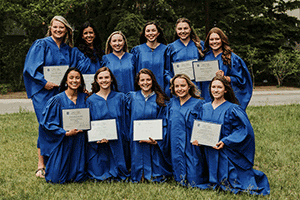
Luther College students are U of R students and receive all the same benefits. Upon graduation you will receive a U of R degree.
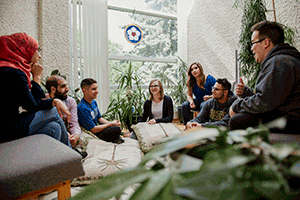
Luther College appeals to students who want to study in a safe, nurturing, and inclusive environment. We welcome students of all faiths, ethnicities, backgrounds, religions, genders, and sexual orientations.
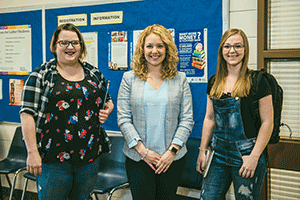
The priority deadline for academic application is March 15. To book a personalized enrolment counselling appointment, contact our Recruitment Office at 1-306-206-2117.
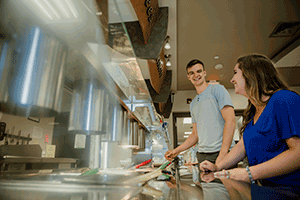
Eating better means studying better. The Luther Cafeteria offers fresh, healthy, nutritious meals seven days a week with a self-serve “all-you-care-to-eat” concept students prefer.

Living in The Student Village at Luther College, our student residence, comes with a choice of healthy, nutritious meal plans. That means no grocery shopping, no meals to cook, and no dirty dishes to worry about. You can focus on your studies and wellness!

Luther students can register in Arts, Science, or Media, Art, and Performance. Luther students are U of R students and receive a U of R degree.
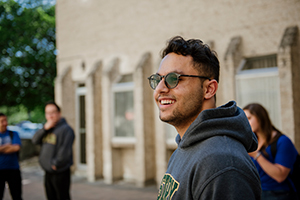
Every degree program at Luther College offers a study abroad option and an optional experiential learning component where you gain real world experience and get paid while going to school!
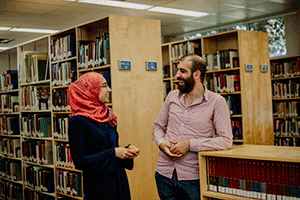
The Luther Library has over 24,000 items in its collection, 5,000 books checked out per year, and 7,000 students who come through its door per month.
Get all the details straight to your inbox!
By Mikyla Jensen (U'15 Recipient of the 2015 LCUR Medal of Distinction)
 As a student majoring in music performance, Gerald Hill’s English 100 class was my first elective. To me, a non-music elective meant I would merely be a number in a class. By the end of my first semester though, not only did Gerry know my name, he knew everything about me from what I specialized in to what my favourite “word of the day” was.
As a student majoring in music performance, Gerald Hill’s English 100 class was my first elective. To me, a non-music elective meant I would merely be a number in a class. By the end of my first semester though, not only did Gerry know my name, he knew everything about me from what I specialized in to what my favourite “word of the day” was.
As a teacher, he continuously pushed me out of my comfort zone by making me read out loud in class. At one point in the semester, he asked me to read William Wordsworth’s “I Wandered Lonely As a Cloud.” I read the poem quite quickly, in my shaky voice, and he made me read it again. The second time, he asked me to consider how the words I said would affect those who were listening around me – the poem became something quite different. Gerry then explained how the first time you hear something should be memorable, not only will it help you remember, it will allow you to personalize the experience. He helped me realize how important it is to be both inside and outside of the information I am reading, explaining, or teaching. Doing this allowed me to put something of myself into my writing while increasing the chance of connecting with my audience by anticipating a variety of reactions. To this day, Wordsworth remains my favourite poet, and “I Wandered Lonely As a Cloud,” my favourite poem.
My favourite part of the class was when he made us go outside the classroom, watch the world around us, and write about what we saw. At first I did not see the point of this exercise; however, I quickly learned that while focusing on one major path in life you tend to miss the small things happening around you. By putting yourself into a new surrounding, you are challenging yourself to be that much more confident and observant.
Later in my degree I decided to join his upper-level creative writing class. Gerry challenged my academic writing skills by making me write poetry – something I had not done since the limerick days of elementary school. By encouraging me to examine each stanza, each line within the stanza, and each word within the line, I became a more diligent student. Most importantly, I began to gain the confidence I needed to take chances with my writing. I was able to write at a much deeper level of thought, consideration, and understanding than I never had before. I asked questions of myself, like “what exactly is it that I want to say?”, and “what is the best way to say exactly what I want?”
Gerry also helped me to take a step back from the hectic, final year of my undergraduate degree and laugh in each class – whether it was from my own mistakes or his stories. Sometimes these stories were step-by-step instructions on how to create a bow and arrow from a bobby pin. Other times, he told us about his personal successes as a writer and, more importantly, his failures. Personally, as someone who is driven by success, his experiences helped me to change my “failures” into successful creative stories and poems. I began to see more of my failures as opportunities to re-invent myself and try, try again.
It took me four years to realize I loved Gerry’s classes because he was so passionate. He got excited about his lectures so that I, as a student, felt like I could too. I loved listening to him read his own poems and books – he puts a little bit of himself in everything that he does. That is how I want to always conduct my own research and influence my students, by encouraging them to accept what makes them unique and put it into writing.
Finally, Gerry inspired me to change the way I teach others; I now talk openly about my past successes and failures with my students and take “mental breaks” in each lesson to make my students laugh and allow them to refocus on the difficult task at hand. Most of all, I continue to stop, sit, watch, listen, and learn by examining every, available detail around me. Incidentally, Gerry retired the same year I graduated from Luther College, but I am happy to hear he returned a year later to continue teaching.